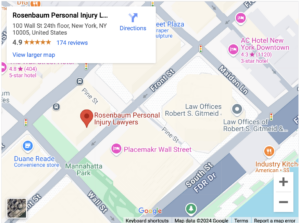What is Strict Liability?

Strict liability is one of the potential grounds for a personal injury claim. This legal doctrine holds a party liable for injuries and damages even if they were not negligent in causing another person’s injuries. While most personal injury claims are based on negligence, there are a few areas where strict liability typically applies.
Negligence vs. Strict Liability
To establish liability under a negligence claim, the plaintiff must prove that the defendant breached a duty of care and caused the plaintiff’s injuries.
However, in a strict liability case, the defendant may be liable for damages or injuries, even though the defendant did not intend to harm the plaintiff. If the defendant’s conduct was the cause of the plaintiff’s injuries, then the plaintiff does not need to prove the defendant demonstrated disregard for the safety of others or was negligent.
Instead, they must prove that the party engaged in certain prohibited conduct and injured them. Three types of personal injury cases use strict liability laws as the basis for a liability claim.
Product Liability Claims
Under product liability law, a party can be held strictly liable if a defective product causes injury or property damage. Three types of cases involving strict liability for defective products are:
- Manufacturing Defects – Here, a product causes injury or damage because of a defect or hazard created during the manufacturing process. In these cases, a plaintiff only needs to show that the product was defective and caused their injury to recover damages.
- Design Defect – A party may be strictly liable if a product has a design defect that makes it inherently dangerous. A product does not necessarily have a design defect because it’s dangerous. Rather, the plaintiff must show that the product contained a flaw in its design that made the product unreasonably dangerous to use.
- Breach of Warranty – Here, the manufacturer or seller issues an explicit or implied warranty that a product works as advertised. If the product fails to work as promised and results in an injury, the seller or manufacturer could be strictly liable.
Strict liability is not automatic in the case of a defective product. A manufacturer, designer, or the seller might not be liable if a consumer used a product in a way that they knew could lead to injury. If the plaintiff knew the product was defective and chose to use it despite that knowledge, the defendant might claim the defense of assumption of risk.
Likewise, if the plaintiff’s negligence contributed to the injury, the defendant might raise contributory negligence as a defense.
Dog Bites and Wild Animals
It is inherently dangerous to keep exotic or wild animals as pets. The danger to the public is exceptionally high if the animal escapes.
A party who has a wild animal is strictly liable for any damages caused by the animal, even if the party takes reasonable measures to secure the animal. However, there may be exemptions for government and educational institutions that house wild animals for study, education, or entertainment.
New York is a mixed strict liability state for dog bite cases. If a “dangerous dog” bites someone in New York, the owner is strictly liable for medical bills. A dangerous dog is one that has attacked, injured, or killed a pet, person, or farm animal or behaves in a dangerous manner. If you can prove the dog owner was negligent, you may recover compensation for other damages.
Abnormally Dangerous Activities
Some activities are unreasonably dangerous and pose a risk of severe harm to individuals. Accordingly, the parties engaging in abnormally dangerous activities can be held strictly liable for damages and injuries to others.
Examples of abnormally dangerous activities include:
- Digging canals
- Storing explosives
- Mass use of poisons, including crop dusting and fumigating
- Demolition and blasting
- Disposing of hazardous materials
- Product or containment of radioactive emissions
Even though the party takes the highest level of care to prevent accidents and injuries, the risk of harm to others cannot be eliminated. The risk is too significant for a person to assume.
What Damages Can I Receive for a Strict Liability Injury Claim?
An injury or accident can cause both economic and non-economic damages. You may be entitled to receive compensation for several types of damages, including:
- Expenses and costs for medical treatment and care
- The cost of nursing care and personal care
- Emotional distress
- Loss of income, including future reductions in earning potential and future lost wages
- Physical pain and suffering
- Disabilities and impairments
- Mental anguish
- Loss of enjoyment of life
Your time to file a personal injury claim is limited by the New York statute of limitations. Because there could be exceptions to the general three-year deadline to file a claim, it is best to speak with an injury lawyer as soon as possible to avoid losing your right to pursue a legal claim for damages.
Schedule a Free Consultation With Our New York Personal Injury Attorney
Proving liability can be challenging. The insurance company and at-fault party may dispute fault. Our legal team is prepared for an aggressive fight to get you the money you deserve. Contact our law office to schedule a free consultation with an experienced New York personal injury lawyer. Learn about your legal rights during a no-obligation, free case review at (212) 514-5007.



